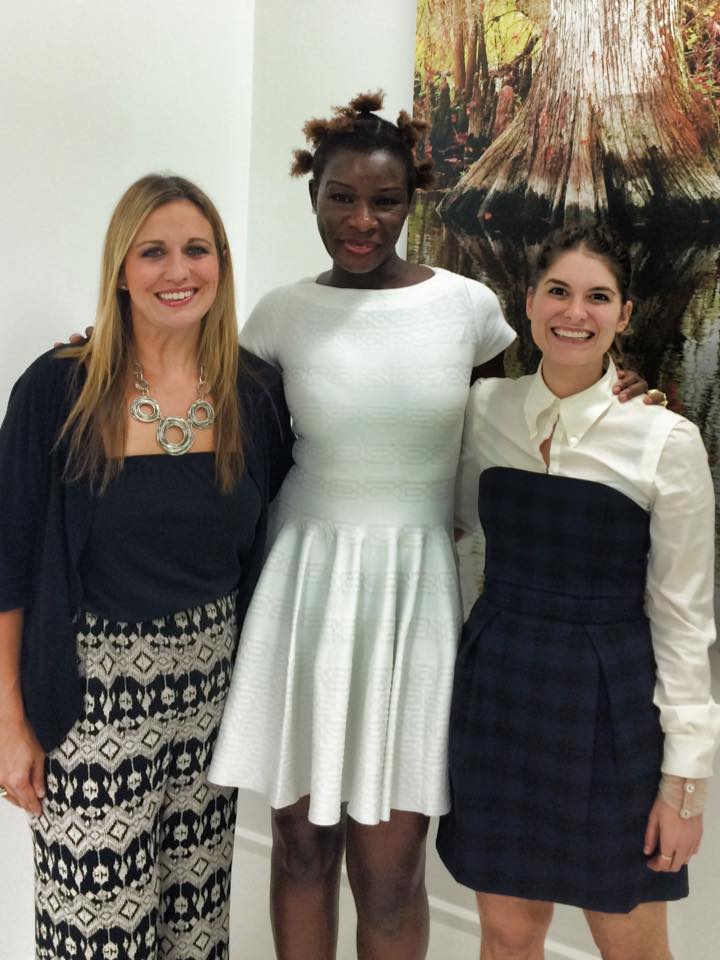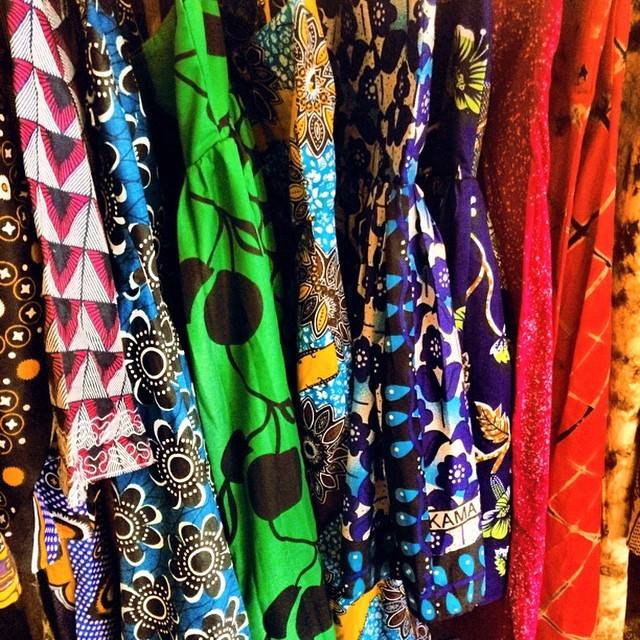
The od AOMO team, from left to right: Amy Schum, Dr. Sophia Aomo Omoro, Hadley Bernstein (Photo: od AOMO Facebook)
In New Orleans, “shop local” typically refers to the most literal meaning of the idiom: to support people and their respective businesses within the greater New Orleans area.
One entrepreneur, however, has expanded upon the Big Easy’s interest in supporting hyperlocal businesses that maintain cultural and artistic authenticity within a society that is rapidly veering toward corporate homogeneity. NOLA-based fashion label od AOMO — the brainchild of Dr. Sophia Aomo Omoro, an otolaryngological surgeon by day — is using her venture to support local communities … some 8,400 miles away. And, in doing so, she’s bringing the art of craftsmanship to NOLA’s fashion environment.
In April 2014, od AOMO made its debut in a small, local fashion show. A month later, Omoro held a trunk show at Gravier Street Social.
“We received such an overwhelmingly positive response that we decided the label needed a permanent residence in NOLA,” Omoro says.
So in August, with the help of Hadley Bernstein, the label’s creative director, Omoro and business partner Amy Schum moved od AOMO to its current location on Chartres Street.
“The timing was just perfect,” Omoro says of securing a coveted French Quarter retail spot. “The space became available, I viewed it on the Fourth of July and we signed a lease within a day. We completely dove in.”
“We’re trailblazers,” Omoro adds of the team, none of whom is formally trained in the particular aspect of od AOMO for which he or she is responsible. “I feel like the culture of New Orleans has afforded us the opportunity to launch the label. We’re not confined to industry standards, which might be harder to defy in, say, New York.”
Originally from Kenya — part of the Luo tribe, traditionally fishermen by trade — Omoro says she’s felt it her duty to give back to Kenyan communities, most of which bear long histories marked by poverty, unemployment and exploitive, non-competitive wages. Such factors have impeded Kenyan villages from securing fair labor practices and establishing self-sustaining economies.

An od AOMO sizing fitting in Kenya, where all of the label’s items are produced and sourced. (Photo: od AOMO Facebook)
“I feel so fortunate to have been able to come here [to America], to have had the opportunities I did,” the doctor and entrepreneur says. “I could straddle both continents and help people. Connect people.”
Omoro has known for years that she would eventually realize her philanthropic dreams through fashion. Her relationship with clothing is more deeply seated in her background than is medicine. While growing up in Kenya, Omoro’s mother worked as a seamstress by profession, which served as the original source for her eye, keenness and talent in the industry.
“We didn’t have a lot of money,” Omoro says, “so my mother used leftover fabric from her work to make my sisters and I clothes.”
Omoro, one of six girls, says she didn’t want to wear garments that were identical to those of her sisters. “Our dresses were often made of the same fabric. I wanted to look different, so I started sketching my own designs and my mother brought those sketches to life.”
Eventually, Omoro, too, became adept at sewing. It was not until she immigrated to the U.S. for secondary education that she began shopping in stores that sold ready-to-wear clothing.
“I constantly found myself wanting to modify tiny details. It was strange seeing other people walking down the street in the same garments. So I decided to get back to sketching.”
Soon enough, Omoro was designing and producing her clothing — at that point in her life, still recreationally.
“Design has been an outlet for me — through medical school, even now. It gives me balance,” Omoro says. “In medicine, we have to be very mechanical. Very sterile. When I design, I can break all of the rules.”
But fashion design, Omoro says, has long existed in her mind as much more than a hobby. “Launching this label that I could use to improve the lives of Kenyans has been a dream of mine for a long time.”
The only label of its kind in the city, od AOMO produces garments and pieces made and sourced from eco-friendly materials in Kenya — the leather goods are constructed of cow byproducts and the jewelry is produced from found shells, so no animals and/or reptiles are harmed for the purpose of fashion.
Omoro is the sole designer of the line, which consists of a unique collection of leather products, including bags, sandals and belts; jewelry; and garments. Stylistically, the label fuses unconventional, fashion-forward aesthetics with a contemporary emphasis on structure, freckled with Victorian elements and ethnic beats. For instance, you might find an open-back, puffed-sleeve crop top, constructed of handmade ivory lace, resting on a rack beside a bold, two-tone chestnut and blood-orange high-low silk skirt.

od AOMO produces garments, shoes and accessories that are best described as fashion forward, with a contemporary emphasis on structure, freckled with Victorian elements and ethnic beats. (Photo: od AOMO Facebook)
“Indigenous Kenyan fashion does play an influential role in my design process, but I wanted something that could be cross-culturally accepted,” Sophia says of the concept underlying her designs.
But the fashion itself is only a small aspect of the label’s mission.
od AOMO employs two full-time Kenyans — George, the label’s only seamstress, and Valentine, the primary jeweler — and one part-time employee who helps out with the jewelry. Every item is handcrafted, every garment hand-stitched, every necklace hand-beaded, and produced in single, limited batches, all within Kenya. The fabrics, though Italian in origin, are sourced from an independent Kenyan textile distributor, run by two young Kenyan women.
Though od AOMO’s Kenyan team is small in number, the venture’s economic impact on its employees’ respective villages is prodigious. By employing these few people, the company, quite literally, supports entire communities.
Kenyan villages are communally-oriented, Omoro explains, so “there’s a trickle-down effect.” The fair wages that Kenyan od AOMO employees garner support their fellow villagers, ultimately generating viable economic networks within their communities.
New Orleans is an ideal city for the project, Omoro says. “It’s such an eclectic city — people don’t want manufactured culture, they want something unique and authentic. People here get culture — they’re invested in it.”
And in the same vein, so is od Aomo.
While bolstering Kenyan economies, the label simultaneously offers a level of craftsmanship that is a rarity in a modern world demarcated by machines and assembly lines.
“In Kenya, people don’t have a lot of money, so they have to be resourceful,” Omoro says. Kenyan villages don’t have the technological and mechanical resources available to U.S. textile and garment manufacturers. Consequently, Kenyan fashion remains tied to a level of a traditional craft unparalleled in most Western fashion houses.
Each od AOMO piece is part of a limited batch — many items, in fact, one-of-a-kind — each bearing nuances of difference due to its handcrafted assembly. And according to Omoro, there’s no comparison between a handmade garment and one that has been laser-cut.
“Craftsmanship is absolutely art. And with mass production, something is lost,” Omoro says. “A machine doesn’t have the heart and the love of a real person stitching a garment.
“It’s all about connection. By buying something — whether you like it or not — you’re helping someone, someone you may never meet.”
Through December, od AOMO will donate 10% of every purchase to a cause that will support Kenyan villages. Customers may choose the specific cause their purchase will support. Items (most priced between $20 and $260) are available online or in-store.
To learn more about how you can get involved in Omoro’s humanitarian initiatives in Kenya, email The Blooming Lily, Omoro’s not-for-profit philanthropic foundation that aims to support and empower women in Kenya.
 NOLAbeings Multimedia artist Claire Bangser created NOLAbeings as a portrait-based story project that marries...
NOLAbeings Multimedia artist Claire Bangser created NOLAbeings as a portrait-based story project that marries...  Voodoo in New Orleans: Reviving history: New Orleans fortune telling This article takes a deep dive into the history of Voodoo in New Orleans, its hybridization with Catholicism, and its present-day place in the city's culture. The author visits fortune-tellers in the French Quarter, using their guidance as a tool for introspection rather than a deterministic predictor of the future. Through her experiences in New Orleans, the author feels a mystical connection to both the past and the future.
Voodoo in New Orleans: Reviving history: New Orleans fortune telling This article takes a deep dive into the history of Voodoo in New Orleans, its hybridization with Catholicism, and its present-day place in the city's culture. The author visits fortune-tellers in the French Quarter, using their guidance as a tool for introspection rather than a deterministic predictor of the future. Through her experiences in New Orleans, the author feels a mystical connection to both the past and the future. 